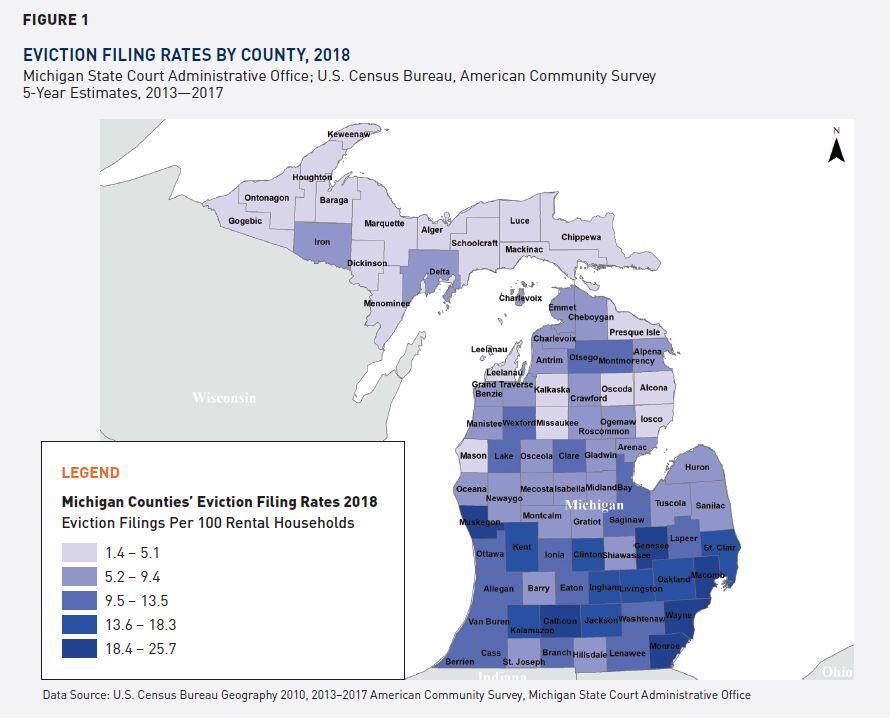Michigan Eviction Project
Published:
06/28/2024
Led by Rob Goodspeed, an assistant professor of urban and regional planning, and Margi Dewar, professor emerita of urban and regional planning, the Michigan Eviction Project was supported by a 2019 grant from U-M’s Poverty Solutions initiative in partnership with the Detroit Community-Academic Urban Research Center, part of U-M’s School of Public Health. Elizabeth Benton, from Legal Services of South Central Michigan, served as the community partner working with Goodspeed and Dewar on the project.
The Michigan Eviction Project found eviction filing rates vary widely by county, from 1.4 percent in Keweenaw County (in the Upper Peninsula) to 25.7 percent in Genesee County (which includes the city of Flint) in 2018. Five of the 10 counties with the highest eviction filing rates are in southeast Michigan.
An eviction filing is a legal complaint filed by a landlord to begin an eviction case, and the exact number of court-ordered, physical evictions is not contained in statewide data.
Other key findings from the study include:
- The number of eviction filings in Michigan has been declining since 2011, but Michigan’s 17 percent eviction filing rate is still higher than rates in Chicago (3.9 percent), Philadelphia (7 to 7.8 percent) and Hamilton County, Ohio (8.7 percent), as documented by other studies. In 2018, Michigan landlords filed a total of 191,512 eviction cases.
- Only 4.8 percent of tenants statewide were represented by an attorney in eviction cases filed in 2014 to 2018, compared to 83.2 percent of landlords.
- Census tracts with high numbers of single-mother households, mortgage foreclosures, and people living in mobile homes tend to have higher eviction case filing rates.
- In urban areas, the number of African Americans and children living in an area, as well as higher vacancy rates, also correlate with higher rates of eviction filings.
Prior research suggests eviction is not only a symptom of poverty, but also a cause of it. People who are evicted from their homes are more likely to lose their jobs, experience increased rates of depression, and rate their health as fair or poor. After an eviction, families tend to move to poorer, higher-crime neighborhoods and are more likely to have problems like broken appliances or lack of heat in their new housing.
The Michigan Eviction Project highlights several recommendations to reduce evictions, including:
- Establish and fund a guaranteed right to counsel for tenants in eviction cases statewide.
- Establish and fund eviction diversion programs in every district court.
- Increase funding for affordable housing and emergency rental assistance.
- Remove the requirement that tenants receive an eviction summons and complaint before becoming eligible for state emergency relief to help with back rent.
- Enact legislation to prevent landlords from charging late fees until the rent is 30 days late, or during the COVID-19 emergency, and limit the amount of late fees.
- Enact legislation to eliminate courts’ ability to award parties in eviction cases $75 to $150 in “taxable costs” on top of their actual costs in the case.
- Enact legislation that limits access to eviction records and permanently seals cases that were dismissed or decided in the tenant’s favor.
Read the policy brief: Michigan’s Eviction Crisis
Read the full report: Michigan Evictions: Trends, Data Sources, and Neighborhood Determinants

Faculty:
Robert Goodspeed
Margaret Dewar





